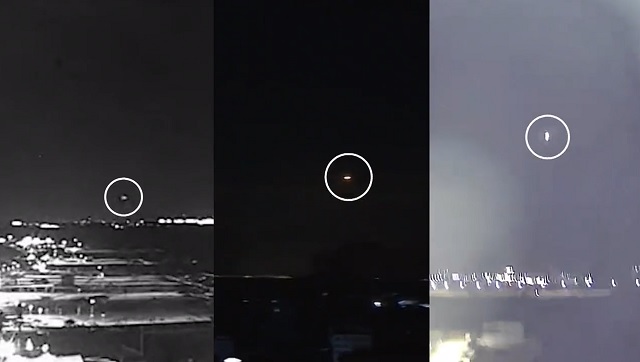
 A New York Times investigation into the al-Ahli Baptist hospital explosion discovered that the "Palestinian rocket" which Israel, the US and tons of media outlets blamed for the bombing was actually fired from Israel. A New York Times investigation into the al-Ahli Baptist hospital explosion discovered that the "Palestinian rocket" which Israel, the US and tons of media outlets blamed for the bombing was actually fired from Israel.
They determined the projectile was "likely unrelated to the deadly blast."
The al-Ahli Baptist hospital was hit by a 155mm illumination shell, "commonly used by the Israeli military and not in use by Palestinian militias," three days before the blast:
From The New York Times, "A Close Look at Some Key Evidence in the Gaza Hospital Blast":
The video shows a projectile streaking through the darkened skies over Gaza and exploding in the air. Seconds later, another explosion is seen on the ground.
The footage has become a widely cited piece of evidence as Israeli and American officials have made the case that an errant Palestinian rocket malfunctioned in the sky, fell to the ground and caused a deadly explosion at Al-Ahli Arab Hospital in Gaza City.
But a detailed visual analysis by The New York Times concludes that the video clip — taken from an Al Jazeera television camera livestreaming on the night of Oct. 17 — shows something else. The missile seen in the video is most likely not what caused the explosion at the hospital. It actually detonated in the sky roughly two miles away, The Times found, and is an unrelated aspect of the fighting that unfolded over the Israeli-Gaza border that night.
The Times’s finding does not answer what actually did cause the Al-Ahli Arab Hospital blast, or who is responsible. The contention by Israeli and American intelligence agencies that a failed Palestinian rocket launch is to blame remains plausible. But the Times analysis does cast doubt on one of the most-publicized pieces of evidence that Israeli officials have used to make their case and complicates the straightforward narrative they have put forth.
[...] Israeli officials and Palestinian militants blame each other for the Al-Ahli Arab explosion. Multiple videos assembled and analyzed by The Times show that militants were firing dozens of rockets from southwest of the hospital minutes before the blast, and the fiery explosion at the hospital is consistent with a failed rocket falling well short of its target with unspent fuel.
The footage also suggests that Israeli bombardment was taking place and that two explosions near the hospital can be seen within two minutes of it being struck. Maj. Nir Dinar, an Israeli military spokesman, told The Times that military forces were not striking “within a range that endangered the hospital,” but declined to say how far away the nearest strike was.
[...] Numerous media outlets have shown the video footage and several have cited it as evidence that a Palestinian rocket hit the hospital.
But The Times concluded that the missile in the video was never near the hospital. It was launched from Israel, not Gaza, and appears to have exploded above the Israeli-Gaza border, at least two miles away from the hospital.
To trace the object in the sky back to Israeli territory, The Times synchronized the Al Jazeera footage with five other videos filmed at the same time, including footage from an Israeli television station, Channel 12, and a CCTV camera in Tel Aviv. These different videos provided a view of the missile from north, south, east and west. Using satellite imagery to triangulate the launch point in those videos, The Times determined that the projectile was fired toward Gaza from near the Israeli town of Nahal Oz shortly before the deadly hospital blast. The findings match the conclusion reached by some online researchers. Kudus to the New York Times for their analysis. You can see more investigations on the strike here.
Channel 4's investigation found the "Hamas phone call" Israel released taking credit for the bombing was likely faked and the rocket trajectories Israel put forward to blame Hamas/Palestinian Islamic Jihad do not line up.
Al Jazeera's investigation discovered Israel conducted four separate airstrikes in the six minutes before the al-Ahli Baptist hospital's courtyard was struck.
Additionally, MEMO spoke with a US weapons expert who said the high-pitched whine captured in the audio of the strike suggests it was an Israeli missile.
Follow InformationLiberation on Twitter, Facebook, Gab, Minds and Telegram.
|






 A New York Times investigation into the al-Ahli Baptist hospital explosion discovered that the "Palestinian rocket" which Israel, the US and tons of media outlets blamed for the bombing was actually fired from Israel.
A New York Times investigation into the al-Ahli Baptist hospital explosion discovered that the "Palestinian rocket" which Israel, the US and tons of media outlets blamed for the bombing was actually fired from Israel. 


